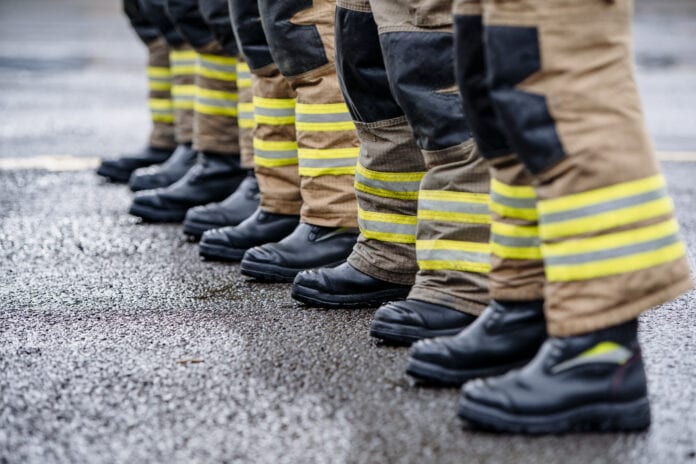We can’t fight incidents like mass-flooding and Covid-19 without more crews, firefighters say- Firefighters responding to 11 of UK’s 12 major threats with 11,237 fewer firefighters – a 19% reduction
- New analysis shows some regions facing biggest threats have lost a third of frontline firefighters since 2010
- Public facing “roll of the dice” with each major incident after cuts, but it’s “only a matter of time” until multiple emergencies hit at once, FBU says
- #FundTheFrontline campaign demands immediate funding of at least 5,000 new firefighters
Fire and rescue services won’t be ready for major threats to the UK without more firefighters, the Fire Brigades Union (FBU) has warned, as new figures show brigades have faced the Covid-19 pandemic with 11,237 fewer firefighters than in 2010.
The combined threats of climate change related events such as flooding and wildfires, pandemics, terrorism, and the post-Grenfell building safety crisis will require the immediate funding for at least 5,000 firefighters in the next year, the FBU says, to ensure the fire and rescue service can tackle “the risks of today and tomorrow”.
Without additional crews, the public face a “roll of the dice” every time a major incident occurs, with firefighters hoping that it won’t coincide with another serious emergency. If the pandemic had broken out during mass-flooding earlier this year, the FBU warns firefighters might not have been able to support the pandemic response.
It comes as new figures reveal the UK has lost more than 11,000 firefighters and control room staff since 2010, a 19% drop in numbers.
The staffing shortage has caused many fire and rescue services to send out fire engines with just three firefighters on board, fewer than the minimum five required to safety perform a rescue or tackle a fire.
Non-fire incidents have soared by 12% over the last decade. Firefighters responded to 162,251 non-fire incidents last year – more than the total number of fires. Surges in flooding and assisting other agencies drove a 6% increase from 2018-19 to 2019-20.
The FBU is today (MONDAY 2 NOVEMBER) launching its #FundTheFrontline campaign, in which firefighters and members of the public will be asked to write to their MPs demanding urgent investment in the government’s one-year spending review.
It comes as the new figures show some of the UK’s most at-risk regions have faced the worst cuts to firefighter numbers since 2010:
- Greater Manchester, now facing Tier 3 Covid-19 restrictions, has lost 629 firefighters, a 32% cut. The city region also has the second-highest concentration of buildings with Grenfell-style flammable cladding in the country, faced three weeks of wildfires covering more than 11 square kilometres in 2018, and has suffered two bouts of major flooding in the last year.
- West Yorkshire, which today moved into Tier 3, has lost 609 firefighters, a 35% cut. Calder Valley has seen six major floods hit in five year. The brigade has responded to persistent wildfires, including a 3,700-acre wildfire on Marsden Moor last year. Leeds, the biggest city in the county, has 13 buildings deemed unsafe due to major fire safety defects.
- South Yorkshire, now in Tier 3, has lost 293 firefighters, a 31% cut. The county faced some of the worst flooding in UK history last summer and a major 10-day long wildfire in Hatfield Moors.
- Buckinghamshire, where the council has warned cases are rising “steeply”, has lost 266 firefighters, or 43% – the worst cuts in the country. The UK’s largest privately-owned nuclear power station is under construction in the county and residents faced flood warnings earlier this month.
Firefighters took on fourteen new activities to respond to the first wave of the pandemic, including moving dead bodies, driving ambulances, and delivering Personal Protective Equipment (PPE). The peak of Covid-19 response operations fell after firefighters were stretched by mass flooding and before they were called out to wildfires.
Firefighters are major frontline responders to 11 of the 12 risks in the UK government’s national risk register, which includes pandemics; severe weather; coastal and inland flooding; major industrial accidents; as well as attacks on transport; crowded places and critical national infrastructure; and Chemical, Biological, Radiological, and Nuclear (CBRN) attacks.
The government’s Building Safety and Fire Safety Bills, intended to tackle the building safety crisis exposed by Grenfell, represent enormous increases in firefighters’ inspection, prevention, and enforcement work, without providing funding to hire more personnel.
Matt Wrack, FBU general secretary, said:
“Be it mass flooding and wildfires caused by climate change, huge post-Grenfell building safety challenges, terrorist attacks; or pandemics, firefighters are an all hazards emergency service on the frontline protecting the UK from the vast majority of major threats.
“But a decade of devastating cuts means that we can only effectively handle one of these crises at a time. The brutal reality is that, if and when mass-flooding or another major emergency hits this winter, it could impact firefighters’ ability to aid the pandemic response, or respond to another major incident.
“Increasingly, each time one of these major emergencies break out, the public face a roll of the dice, hoping that more than one won’t come at once – and it’s only a matter of time until we lose that gamble.
“Boris Johnson and Rishi Sunak need to recognise the scale of risk faced by the public and fund the frontline firefighters who keep people safe. We need at least 5,000 new firefighters immediately to repair some of the damage austerity has done to our service and prepare for the risks of today and tomorrow.”
Help keep news FREE for our readers
Supporting your local community newspaper/online news outlet is crucial now more than ever. If you believe in independent journalism, then consider making a valuable contribution by making a one-time or monthly donation. We operate in rural areas where providing unbiased news can be challenging. Read More About Supporting The West Wales Chronicle























